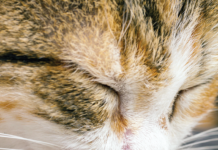Urinalysis (UA) is an integral part of clinical veterinary practice, and the use of dry reagent urine-testing strips is an essential component of UA in most veterinary practices.
Hematuria (blood in the urine) is commonly encountered, and the effects of hematuria on dry reagent strip results and on urine specific gravity (SG) have not been previously investigated in a controlled fashion.
A recent study published in the American Journal of Veterinary Research using feline and canine blood added to pooled feline and canine urine samples, respectively, suggests that any degree of blood contamination in the urine of either species affects not only the dry reagent score for blood, but also for bilirubin, pH, and ketones. Scores for glucose were not affected. The ability to evaluate urine concentrating ability was unaffected in hematuric samples except except for those with a fairly high urine concentration.
This study highlights the fact that any degree of hematuria can affect dry reagent results on feline and canine UA, and that hematuria may result in high urine protein readings on these tests in both species. n


